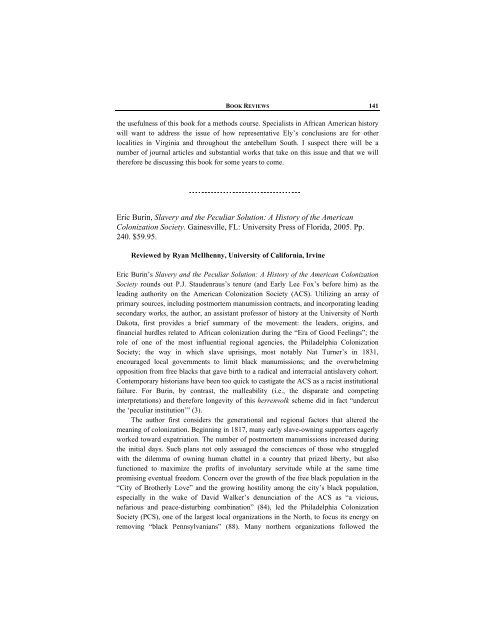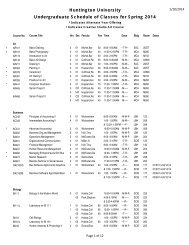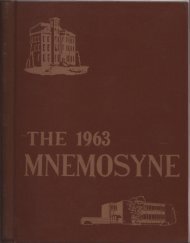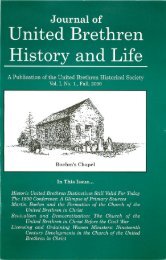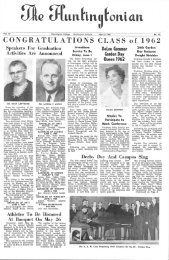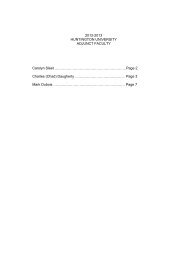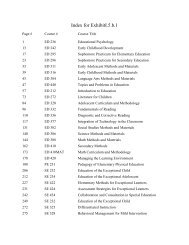Gillian Clark, Christianity and Roman Society - Huntington University
Gillian Clark, Christianity and Roman Society - Huntington University
Gillian Clark, Christianity and Roman Society - Huntington University
You also want an ePaper? Increase the reach of your titles
YUMPU automatically turns print PDFs into web optimized ePapers that Google loves.
BOOK REVIEWS 141<br />
the usefulness of this book for a methods course. Specialists in African American history<br />
will want to address the issue of how representative Ely’s conclusions are for other<br />
localities in Virginia <strong>and</strong> throughout the antebellum South. I suspect there will be a<br />
number of journal articles <strong>and</strong> substantial works that take on this issue <strong>and</strong> that we will<br />
therefore be discussing this book for some years to come.<br />
Eric Burin, Slavery <strong>and</strong> the Peculiar Solution: A History of the American<br />
Colonization <strong>Society</strong>. Gainesville, FL: <strong>University</strong> Press of Florida, 2005. Pp.<br />
240. $59.95.<br />
Reviewed by Ryan McIlhenny, <strong>University</strong> of California, Irvine<br />
Eric Burin’s Slavery <strong>and</strong> the Peculiar Solution: A History of the American Colonization<br />
<strong>Society</strong> rounds out P.J. Staudenraus’s tenure (<strong>and</strong> Early Lee Fox’s before him) as the<br />
leading authority on the American Colonization <strong>Society</strong> (ACS). Utilizing an array of<br />
primary sources, including postmortem manumission contracts, <strong>and</strong> incorporating leading<br />
secondary works, the author, an assistant professor of history at the <strong>University</strong> of North<br />
Dakota, first provides a brief summary of the movement: the leaders, origins, <strong>and</strong><br />
financial hurdles related to African colonization during the “Era of Good Feelings”; the<br />
role of one of the most influential regional agencies, the Philadelphia Colonization<br />
<strong>Society</strong>; the way in which slave uprisings, most notably Nat Turner’s in 1831,<br />
encouraged local governments to limit black manumissions; <strong>and</strong> the overwhelming<br />
opposition from free blacks that gave birth to a radical <strong>and</strong> interracial antislavery cohort.<br />
Contemporary historians have been too quick to castigate the ACS as a racist institutional<br />
failure. For Burin, by contrast, the malleability (i.e., the disparate <strong>and</strong> competing<br />
interpretations) <strong>and</strong> therefore longevity of this herrenvolk scheme did in fact “undercut<br />
the ‘peculiar institution’” (3).<br />
The author first considers the generational <strong>and</strong> regional factors that altered the<br />
meaning of colonization. Beginning in 1817, many early slave-owning supporters eagerly<br />
worked toward expatriation. The number of postmortem manumissions increased during<br />
the initial days. Such plans not only assuaged the consciences of those who struggled<br />
with the dilemma of owning human chattel in a country that prized liberty, but also<br />
functioned to maximize the profits of involuntary servitude while at the same time<br />
promising eventual freedom. Concern over the growth of the free black population in the<br />
“City of Brotherly Love” <strong>and</strong> the growing hostility among the city’s black population,<br />
especially in the wake of David Walker’s denunciation of the ACS as “a vicious,<br />
nefarious <strong>and</strong> peace-disturbing combination” (84), led the Philadelphia Colonization<br />
<strong>Society</strong> (PCS), one of the largest local organizations in the North, to focus its energy on<br />
removing “black Pennsylvanians” (88). Many northern organizations followed the


